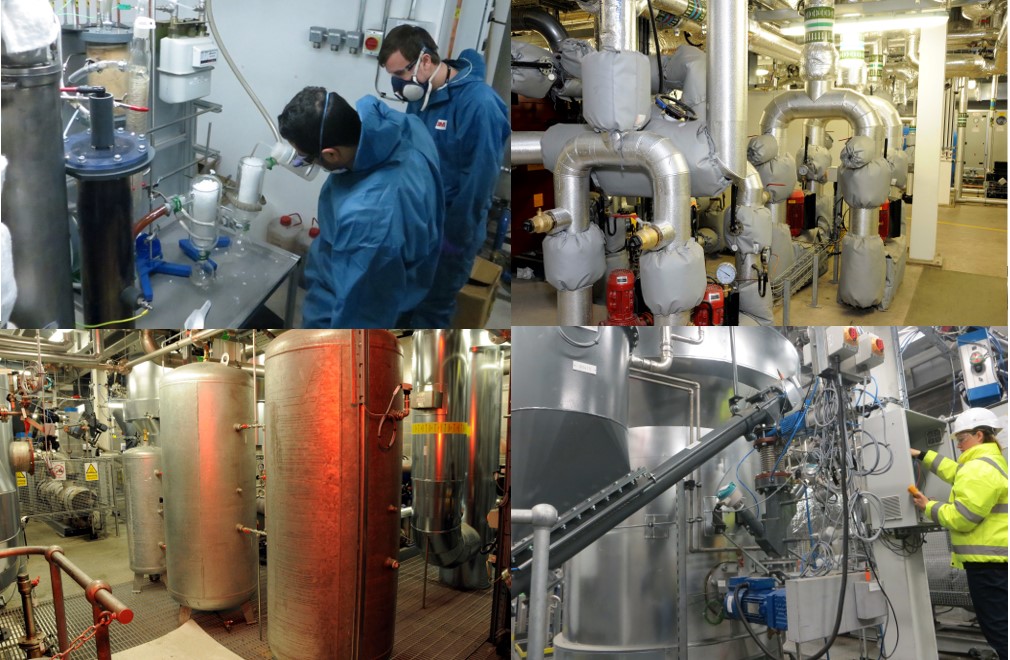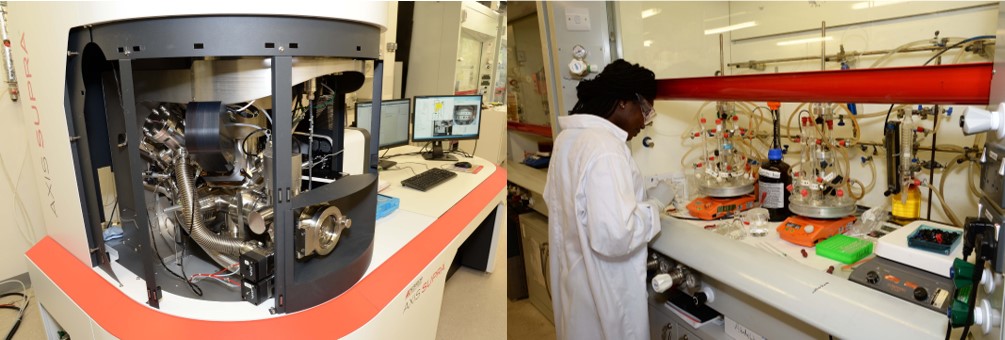EBRI conducts world class bioenergy and energy systems research – ranging from fundamental research and development through to the deployment of innovative technologies. Our activities focus on scientific and technological aspects of biomass production, conversion and utilisation of products for renewable power, heat, transport fuels, hydrogen and chemicals.
EBRI’s capabilities cover the breadth of advanced thermal, and catalytic conversion processes. These include gasification, pyrolysis, catalysis and upgrading of biomass, wastes and plastics to high quality products and fuels.
Thermo-chemical
 Pyrolysis
Pyrolysis
All types of pyrolysis are being researched and developed in EBRI including fast, intermediate and slow pyrolysis, as well as torrefaction and biochar.
Pyrolysis is thermal decomposition occurring in the absence of oxygen. Lower process temperatures and longer vapour residence times favour the production of charcoal. High temperatures and longer residence times increase biomass conversion to gas, and moderate temperatures and short vapour residence time are optimum for producing liquids. Three products – gas, liquid and solid – are always produced.
Gasification
EBRI’s research is mainly focused on addressing the technical barriers of existing gasification technology through research and development. We also carry out more fundamental studies into downdraft and fluidised bed gasification using a combination of laboratory-scale units and computational modelling. One particular area of interest is dual fluidised bed gasification where the gas is produced in the absence of oxygen in one bed, and the resulting char is separated and combusted in a second bed in order to return the necessary heat to the first bed.
Biological
 Biological conversion of biomass
Biological conversion of biomass
Microalgae
There is currently much global interest and investment in cultivating microalgae as a source of biofuels, as they do not directly compete with food crop-based commodities and are typically grown in non-arable land areas. Potential biofuels from microalgae include direct combustion, pyrolysis, hydrogen, alkanes or “green diesel”, biodiesel alcohols (ethanol) and methane.
Anaerobic Digestion (AD)
Researchers at EBRI are investigating linking different energy generation processes together to increase the net energy yield which can be obtained from original waste and residue streams. Initial research has demonstrated that by linking anaerobic digestion and intermediate pyrolysis together, wastes can be utilised more effectively.
Energy Systems
 Smart distributed energy systems including Vehicle-to-Grid (V2G) technology
Smart distributed energy systems including Vehicle-to-Grid (V2G) technology
EBRI along with its VIGIL partners are working together to develop a new communication and control platform for Vehicle-to-Grid/Building (V2G/V2B) systems: an off-vehicle system that controls how, when and the rate at which electric vehicle batteries are charged and discharged with respect to local substation constraints and building energy requirements. A communications adaptor will be developed to ensure the flexibility and compatibility of the VIGIL platform with different manufacturer’s V2G charge-points. A V2G mobile application will be also delivered, together with an optimised building management system.
Catalytic
 Catalyst development, production and characterisation
Catalyst development, production and characterisation
EBRI’s research focuses on developing new heterogeneous catalysts for the sustainable transformation of biomass into fuels and chemicals. Through the use of advanced nanotechnologies and surface sensitive techniques, we aim to obtain molecular level insight into important surface phenomena over metal, metal oxide and alloy catalysts. The importance of surface chemistry in everyday life is also reflected in the diversity of research undertaken within our group, ranging from designer catalysts for clean chemical synthesis, to improved magnetic materials for high density data storage and even novel antibacterial wound dressings.
Simply drop us a line to let us know how we can help.
Click ‘Contact EBRI’ to complete our online enquiry form.
Alternatively email [email protected]
or call us on 0121 204 3383.




